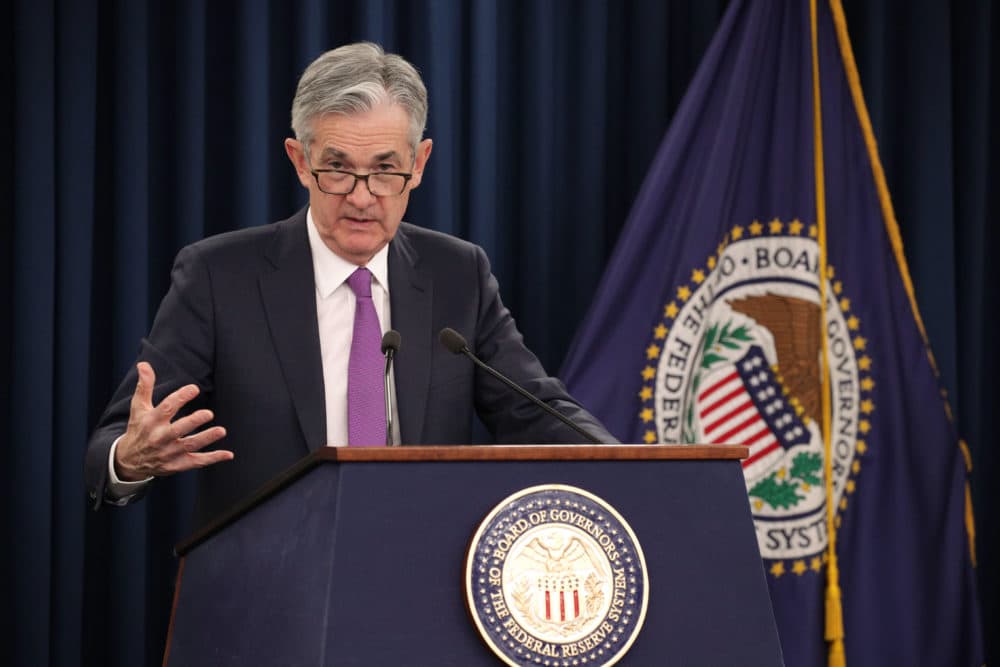Advertisement
Former Treasury Secretary Weighs In On Fed Backing Off Interest Rate Increases
Resume
The Fed on Wednesday backed off its plan to continue increasing rates this year in order to maintain U.S. economic growth.
Here & Now's Jeremy Hobson talks with Larry Summers (@LHSummers), former secretary of the Treasury and president emeritus of Harvard University, about interest rates, tax rates and other economic issues.
Interview Highlights
On whether he agrees that raising interest rates in the near future would cause the economy to slow down
"The risks of a near-term increase in rates are substantially greater than any potential benefits. Inflation appears to be quite quiescent with inflation expectations declining. There's evidence that the economy is slowing. So in a situation of that kind, why do you want to hit the brakes? The vehicle is if anything at more risk of slowing down too much than of accelerating too much, and it's very important to remember in thinking about monetary policy that it operates with a substantial lag. And so the effects of policy on the economy over the next six months are not going to be the policies that are pursued in the next six months, they're going to be the lagged effects of the policies that have been pursued over the last year.
"So I think the Fed, perhaps belatedly, has come to the view that there's really not a case for raising rates. They've embraced the view that the kind of normal real interest rate at which the economy will move forward at a reasonable pace, which used to be quite fast, has slowed down considerably."
On whether the Fed is bowing to pressure from President Trump, who's been vocal about not wanting the Fed to raise interest rates
"I don't see any evidence that this is a response to White House pressure. It seems to me that if you listen to the economic commentariat, they mostly have been calling for moves of this kind. If you look at what the market's been saying, the market has been signaling a desire for an adjustment of this kind. So I see no reason to think that you have to look to White House political pressure to explain."
On if there are any signs of a recession on the horizon, and what the biggest risks to the U.S. economy are right now
"It's very hard to predict recessions, and usually when we have recessions, we don't succeed in predicting them in advance. I think the risks of the economy going into recession this year are not that high, perhaps 15 percent. I think the risks of the economy going into recession by the end of next year are approaching 50 percent. I think the things to look for are what are markets pricing our markets anticipating that the Fed will have to ease our markets seeing big increases in credit spreads our stock prices declining. I think those are all important indicators for judging the likelihood of recession if a recession comes. I think it's most likely to be because of a spontaneous downdraft in markets or it's likely to be because of the uncertainties associated with the global economy and the geopolitical overlay."
On Democratic Rep. Alexandria Ocasio-Cortez's proposal of raising the tax rate on incomes above $10 million to 70 percent
"She is right. The congresswoman is completely right to emphasize the importance of progressivity, and to emphasize the importance of taking much more from the very top group in our population. I think though the place that policy should start is with base broadening and better enforcement. The fact that compliance audit rates for the richest people have gone way down is a scandal. The fact that tax shelters have been allowed to proliferate, and in some ways were magnified by the recent tax cut, is just wrong. So I think you can raise substantial revenue — more revenue in fact than the 70-percent plan would raise — with base broadening in areas like capital gains, in areas like better enforcement on estates. That's where I'd rather see policy begin."
"There is a lot of room for making the system both more efficient and more fair by broadening the tax base, and that's the better way to go at raising revenue from people with high incomes."
Julia Corcoran produced this interview and edited it for broadcast with Kathleen McKenna. Jack Mitchell adapted it for the web.
This segment aired on January 31, 2019.
